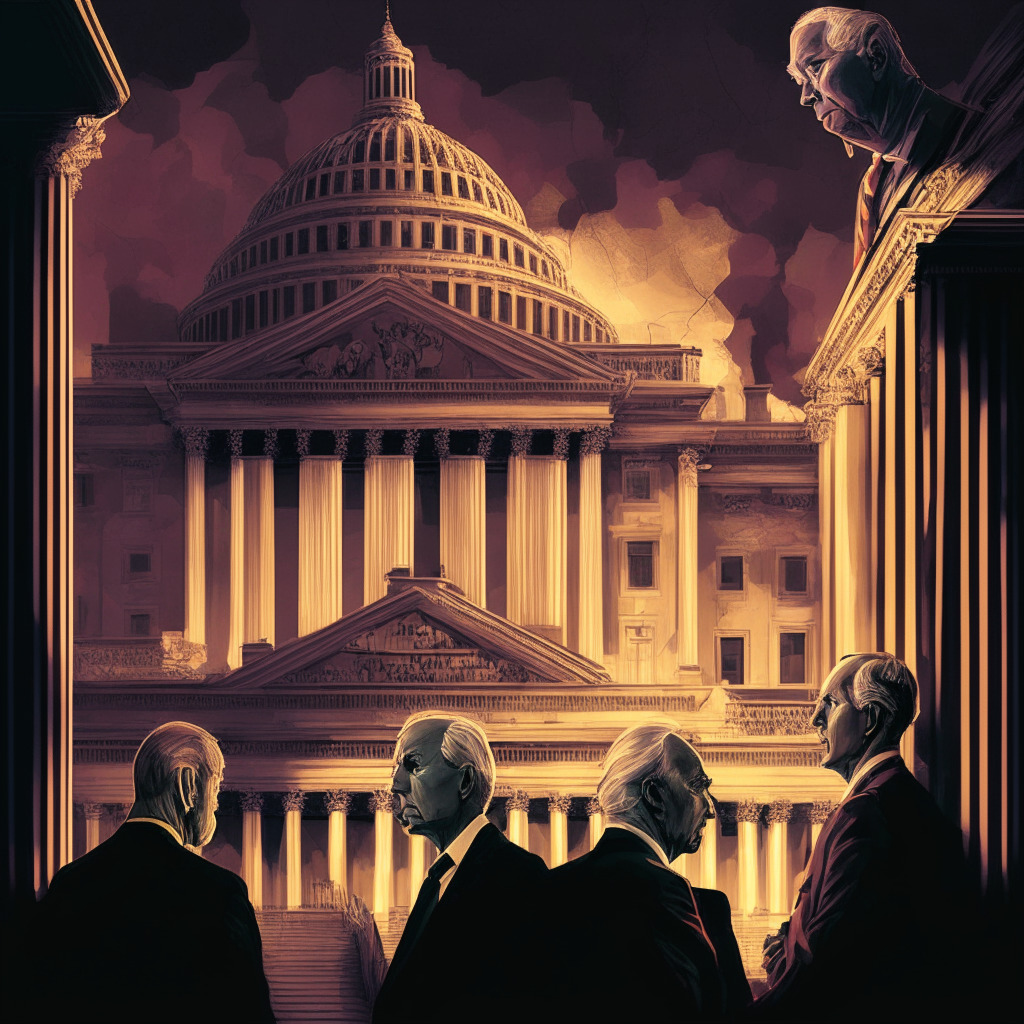Twitter CEO Jack Dorsey supports pro-crypto Democrat candidate Robert F. Kennedy Jr., who accepts Bitcoin donations for his presidential campaign. Kennedy criticizes CBDCs as tools to suffocate dissent and condemns a proposed 30% tax on crypto mining.
Search Results for: Republic Crypto
Crypto Market Resilience Amid US Debt Dilemma and Regulatory Challenges
Crypto market displays resilience amid regulatory challenges and US debt concerns, with experts predicting pre-FOMC market correction. Experts expect correction and consolidation between $25K-$27K levels, while the decline in bitcoin options put/call ratio indicates reduced investor concerns. Ethereum’s post-merge performance captures market attention through increased staking demand and realized deflationary promise.
Proposed Crypto Bill: Balancing SEC Power and Fair Regulation in Digital Asset Industry
A drafted crypto bill proposed by Republican lawmakers aims to establish a clear framework for digital assets and hold regulatory bodies like the SEC and CFTC accountable for their actions, potentially changing the way digital assets are regulated. The bill could encourage fair enforcement practices, ensure consumer safety, and support innovation within the cryptocurrency markets.
Digital Assets Debate: Clarifying Security vs Commodity and the Impact on Crypto Regulations
The proposed draft legislation aims to clarify the distinction between a security and a commodity in the digital asset space, establishing when they should be regulated by the SEC or CFTC. This legislation promises to bring clarity and transparency, ensuring future stability and success for the financial sector.
Pathway to Digital Commodities: Balancing Innovation and Regulatory Compliance in Crypto
The draft bill by the United States House Financial Services Committee and House Agriculture Committee proposes a pathway for certain crypto assets to be labeled as digital commodities, offering regulatory clarity for crypto firms. However, it also raises concerns over digital assets’ classification and potential limitations due to increased regulatory measures.
Draft Bill May Reshape Crypto Regulation: Pros, Cons, and Main Conflict
Senior House Republicans introduced a draft bill aiming to establish a concise framework for digital assets in the U.S., allowing regulated crypto firms to argue for commodity classification. The legislation would also introduce digital commodity exchanges with oversight by the Commodity Futures Trading Commission. However, it currently lacks support from Democrats and faces challenges in achieving consensus.
SEC-Registered Crypto Exchanges: Boon or Bane for Digital Assets Future?
A proposed bill could allow crypto exchanges to register with the U.S. SEC, enabling trading of digital securities, commodities, and stablecoins in one place. However, it faces caveats such as lack of Democratic support and ongoing SEC authority over asset jurisdiction.
Asian Adoption Surge: WeChat’s BTC Move and Hong Kong’s Crypto Exchange Impact
The crypto market faces decreased institutional interest and deflated enthusiasm despite retail investors adding stability. Chinese app WeChat added BTC price quotes, and Hong Kong allowed retail crypto trading on regulated exchanges, signaling increased Asian adoption, and possible market tailwinds.
Debt Ceiling Raise: Short-Term Relief, Long-Term Crypto Market Impact and Uncertainty
The U.S. Senate’s decision to raise the debt ceiling has averted a potential default, positively impacting markets, including the cryptocurrency market. However, long-term repercussions remain uncertain, with concerns about quantitative tightening and tightening liquidity. Investors and crypto enthusiasts should closely monitor market developments before making investment decisions.
2024 Presidential Election: Crypto Regulation Takes Center Stage in Debates
The 2024 US presidential election could witness discussions on crypto market regulation taking center stage, impacting the US’s position as a global crypto hub. Prospective candidates like Ron DeSantis and Robert F. Kennedy Jr. openly support digital asset trading freedom, while JP Morgan CEO Jamie Dimon’s potential candidacy raises questions about cryptocurrency’s role in the American financial landscape.
Market Overview: Bitcoin Whales, Debt Ceiling, and Chinese Manufacturing Impact Crypto
Today’s market overview reveals mixed feelings among investors as Bitcoin settles above $27.1K. Factors contributing to bearish sentiment include hawkish comments by Cleveland’s Federal Reserve Bank president, disappointing Chinese manufacturing data, and uncertainty around the U.S. debt limit. Bitcoin whales reduce holdings amidst growing uncertainty, leading to a 2.2% drop in price.
Crypto Divide in 2024 US Presidential Election: DeSantis vs Biden on Bitcoin & CBDCs
Digital assets are becoming a significant topic in the 2024 U.S. presidential election, with Florida Gov. Ron DeSantis championing a pro-crypto stance while critics accuse the Biden administration of hindering crypto growth and advocating for CBDCs. The debate’s potential influence on the election is still uncertain.
Tether Invests in Georgia’s Crypto Scene: Analyzing the Impact & Challenges of Adoption
Tether plans to expand in the Republic of Georgia by investing in CityPay.io, a leading payment processing company. Georgia is becoming an attractive destination for cryptocurrency companies, thanks to its progressive regulatory framework and initiatives like Binance’s new blockchain hub.
Debt Ceiling Negotiations and Cryptocurrency: Seeking the Perfect Balance
The House of Representatives votes on postponing the debt ceiling until 2025 through the Fiscal Responsibility Act of 2023. This bipartisan agreement will impose limits on discretionary spending, but its impact on growth, innovation and the cryptocurrency sector requires a delicate balance between fiscal responsibility and flexibility.
Debate on CBDCs and Crypto’s Role in Dark Web Drug Trafficking: A New Congressional Duel
As the debt ceiling deadline nears, crypto-focused bills address Central Bank Digital Currencies (CBDCs) and cryptocurrencies’ role in dark web drug trafficking. Concerns over privacy and potential legal issues arise from retail CBDCs, while bipartisan bills call for increased transparency and harsher penalties for dark web trafficking.
US Debt Ceiling Chaos Spurs Diversification into Cryptos: Analyzing WSM, QNT, and More
Amid uncertainty over the US debt ceiling, market participants explore diversification into cryptocurrencies such as WSM, QNT, ECOTERRA, INJ, YPRED, LDO, and DLANCE. Enthusiasts consider the environmentally-focused web3 initiative, Ecoterra, an integral part of the global climate change strategy.
Increased CFTC Crypto Oversight: Balancing Regulation, Innovation, and Market Security
CFTC’s Division of Clearing and Risk (DCR) is increasing scrutiny on cryptocurrencies, focusing on potential risks and adherence to core principles. The move aims to provide security and clarity for investors while balancing innovation and market stability in the rapidly evolving crypto industry.
Surge in Republican Opposition to CBDCs: Privacy Concerns vs Financial Inclusion Benefits
Recent opposition from Republican lawmakers to a central bank digital currency (CBDC) raises concerns over government surveillance and privacy threats, as they argue a digital dollar could grant federal officials unprecedented access to individuals’ financial data. The future of the Federal Reserve’s potential pilot program remains uncertain amid intensified debate surrounding CBDCs.
Crypto Bills in Limbo: Texas Legislature’s Inaction and Its Impact on the Industry
Texas’ regular legislative session closed, leaving cryptocurrency bills unresolved for potentially 19 months. One notable bill, Texas Senate Bill 1751, aimed to eliminate tax breaks for miners and impose stricter energy usage control. Another bill, House Bill 1666, seeks to mandate cryptocurrency exchanges to hold adequate reserves for customer obligations.
Bitcoin ETFs Surge 5%: Institutional Buying and Debt Ceiling Deal Fuel Crypto Rally
Multiple Bitcoin ETFs, including ProShares Bitcoin Strategy ETF (BITO) and Valkyrie Bitcoin Strategy ETF (BTF), witnessed a 5% jump in pre-market hours on Tuesday, indicating institutional buying and anticipation of a BTC price rally. The recent debt ceiling agreement between President Joe Biden and Republicans eliminated a 30% tax on Bitcoin mining, positively affecting markets.
Crypto Miners Dodge Tax Bullet in US Debt Ceiling Deal: Pros, Cons, and Main Conflict
The latest U.S. debt ceiling bill draft potentially eliminates a proposed 30% tax on electricity used by cryptocurrency miners, as part of President Biden’s FY2024 budget. The legislation, aiming to prevent a government debt default, still needs congressional approval.
Crypto Mining Tax Shelved: Balancing Innovation, Regulation, and Sustainability Debate
The proposed Digital Asset Mining Energy excise tax (DAME) on cryptocurrency mining is absent from the recent US debt ceiling deal, stirring debates. While proponents argue DAME could generate revenue and promote eco-friendly practices, critics warn against stifling the growing industry with taxes.
Debt Ceiling Agreement Blocks Crypto Mining Tax: A Win for the Industry or Environmental Setback?
The recent U.S. debt ceiling agreement has notably blocked the proposed Digital Asset Mining Energy (DAME) excise tax, preventing a 30% tax imposition on cryptocurrency mining firms. This outcome, seen as a victory for the crypto industry, has sparked debates around the environmental impact of crypto mining operations and the importance of addressing energy consumption concerns for a sustainable future.
Crypto Market Rises with Debt Ceiling Deal: Will Fed Policy Meeting Impact the Trend?
The cryptocurrency market, including Bitcoin and Ethereum, experienced a boost alongside the stock market as U.S. lawmakers reach a tentative deal for the federal government’s debt ceiling. The outcome of the upcoming Federal Reserve policy rate meeting may impact the cryptocurrency market’s upward trajectory.
Debt Ceiling Deal Blocks Crypto Mining Tax: Boon or Bane for the Industry and Environment?
President Joe Biden and House Representative Kevin McCarthy reached a tentative debt ceiling deal that, if passed, would block the proposed 30% tax on crypto miner’s electricity bills. Critics argue the blocked tax denies encouragement for sustainable energy practices in the crypto mining industry, while proponents view it as a victory for maintaining competitiveness.
Crypto Market Surges Amid US Debt Ceiling Negotiations: Relief or Overconfidence?
Cryptocurrency prices received a boost as the likelihood of a US debt default seemed less probable. Bitcoin climbed 2.9%, Ethereum was up 1.4%, while altcoins like Cardano and Solana saw even bigger gains. Uncertainty remains regarding the debt ceiling situation and its potential impact on markets; crypto enthusiasts should remain vigilant and informed.
Debt Ceiling Deal Boosts Bitcoin: Navigating Politics and Crypto Market Opportunities
The crypto market surged as Bitcoin crossed $27,000 following an in-principle debt ceiling deal agreement between President Joe Biden and Kevin McCarthy. The deal averts potential economic recession, brings relief and security, and could lead to a Bitcoin rally, highlighting the importance of understanding the implications of economic policies on the crypto market and staying informed about political events that shape the industry’s trajectory.
Debt Ceiling Crisis Looms: Potential Impacts on Crypto and Financial Markets
As the US faces a potential debt crisis, ongoing high-stakes discussions about raising the $31.4 trillion debt ceiling could impact financial markets, including the cryptocurrency sphere. Swift resolution of lingering issues is critical to avoid a widespread crisis and market uncertainty.
Crypto Week Highlight: Mastercard, Elon, Tax Evaders, and Global Regulations
This crypto news roundup features Mastercard’s EVP on crypto and blockchain’s financial value, Ripple’s $1 billion expansion, and Biden’s crackdown on wealthy tax evaders. Other highlights include Binance’s rebuttal on mixed funds, Coinbase’s petition to the SEC, global crypto regulations, and ongoing vigilance against scams and cybercrimes.
Polarization of Crypto Debate: Finding Common Ground for Progress and Innovation
The crypto debate in the U.S. has become polarized and politicized, hindering technical discussions on policy and technology. Social media fuels the issue, promoting fear-mongering and limiting productive conversations. A constructive, open-minded approach to discussions is essential for progress and understanding the potential of cryptocurrencies.
2024 Presidential Race: Crypto Policies Take Center Stage and Impact on Voters’ Choice
The 2024 U.S. presidential race sees candidates like Ron DeSantis, Robert F. Kennedy Jr., and Vivek Ramaswamy supporting cryptocurrencies, expressing their belief in financial freedom and innovation. However, the balance between promoting crypto and ensuring safety remains crucial, making the 2024 elections a litmus test for crypto in the U.S. political landscape.
Crypto Custody Conflict: SEC Rule vs Diverse Solutions and Investor Protection
The SEC proposed a rule that may limit certain financial stakeholders in cryptocurrency custody requirements. Lawmakers Torres and Flood argue that excluding state-regulated institutions as qualified custodians could stifle competition and stress the importance of maintaining diverse custodial solutions while protecting investors.































